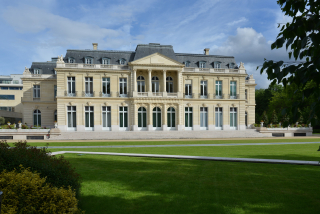When I began my legal education, I largely thought that I was leaving behind my past professional experience in human resources (HR) and corporate management. Before law school, my varied interests and involvement in my school co-op program led me to work in numerous corporate management functions such as the business management division of HR at Canada Revenue Agency, strategic planning and procurement at PSPC, and the diplomatic relocation and protocol section of management at the Embassy of Canada in Washington, D.C. These professional experiences helped me develop a deeper understanding and interest in the administration of law and policy, particularly in public institutions.
Consequently, I was pleasantly surprised when I came across the posting for the OECD Legal internship in the Human Resource Management (HRM) division which offered the opportunity to work on projects linked to the strategic orientations of the Secretary-General and to support the corporate functions of the Organisation.

Given the OECD’s mission and my experience in HR, I was keen to develop further experience in an international context and learn more about the legal dimensions of HR and governance in international organisations. In addition, I welcomed the opportunity to work in a bilingual pluralist environment, much like the transsystemic approach I’ve become accustomed to in the law program at McGill.
In fact, my McGill legal training provided me with a strong academic background to assist with the varied tasks I was assigned in support of the HR Legal and Policy function. Among other things, I was tasked with supporting the renewal of the OECD ethics framework, preparing communications for staff to inform them of updates to the legal and policy framework, reviewing staff requests for conflicts of interest, drafting and advising on personnel employment contracts, and reviewing benchmark studies on best practices amongst similar international organisations.
A key project that I worked on during my internship was the largescale revision and update of the OECD Harassment and Conflict Prevention policy that was adopted this summer after two years of revision. This was of particular interest to me as the policy sought to provide a more robust framework for addressing workplace harassment, sexual harassment, and other inappropriate behaviours. Through the use of benchmark studies, international administrative case law, and organizational best practices, my team rewrote and developed a comprehensive new policy that will guide staff and management in the reporting, investigation and resolution of harassment claims going forward. Although I joined HRM near the end of the project, there was plenty to do as I quickly learnt the policy’s history in order to prepare briefing materials for consultations with important internal stakeholders. In the end, I was fortunate to witness the culmination of those efforts when the revised policy was adopted by the Secretary-General with overwhelming institutional support.

My internship experience would not have been possible without the generous scholarship offered by the McGill Faculty of Arts and the Internship Offices Network. Though the OECD offers interns a monthly stipend, it would not have been enough to cover all of my living expenses or compare to a full-time wage. For that reason, I am grateful for the additional financial support that allowed me to benefit fully from the OECD internship programme and offer my sincere thanks to McGill for the opportunity!
